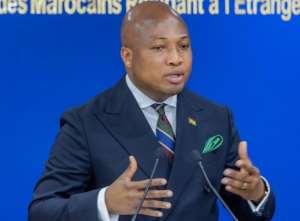
Ghana’s Minister of Foreign Affairs, Samuel Okudzeto Ablakwa, has unveiled a series of sweeping reforms aimed at improving the quality of service at the country’s embassies and consulates, following persistent complaints from Ghanaians abroad.
One major change is the introduction of a new policy that mandates the recording and review of all official telephone calls to diplomatic missions.
In a Facebook post on Tuesday, June 10, 2025, Mr Ablakwa acknowledged the mounting frustrations voiced by the public over unresponsive and discourteous behaviour at some missions, describing them as “justified grievances.” He noted that although many of these issues predated his appointment, he takes “full responsibility” and is committed to resolving them.
The reforms come amid increased criticism from the diaspora, including a widely circulated account by Professor Kojo Dei, who detailed negative experiences at two separate Ghanaian missions. Mr Ablakwa called the professor’s report “deeply troubling” and assured the public that such behaviour “would not be tolerated” under his leadership.
The new measures are part of President John Mahama’s broader RESET Agenda, and Mr Ablakwa outlined six key changes designed to overhaul diplomatic services. These include a revamped code of conduct for embassy staff, upgraded phone systems to handle multiple incoming calls, and periodic evaluations of recorded calls to ensure professional standards are met.
He said embassies will now be monitored through systems set up with telecom service providers to confirm whether public calls are being answered, and that ambassadors and high commissioners will be held accountable for their accessibility and responsiveness. Those who fall short of expectations will face disciplinary action.
Responding to recent complaints about delays in visa processing at Ghana’s mission in Washington, D.C., Mr Ablakwa reported significant progress. He noted that 2,943 visas have been issued since the mission resumed operations. According to him, the embassy had long struggled with internal corruption, which he said has now been “dealt with.” He added that he had visited the mission personally to help clear a backlog of applications and ensure that new protocols were implemented.
While acknowledging that many Ghanaian missions around the world continue to deliver quality service “with professionalism and empathy,” Mr Ablakwa admitted that several have consistently fallen short—and said that would no longer be tolerated.
He urged the public to support the RESET Agenda, which he said is focused on “addressing corruption, eliminating conflicts of interest, protecting applicants from exploitation, and improving Ghana’s reputation abroad.”
Mr Ablakwa concluded by reaffirming the Mahama administration’s commitment to building a new era of public service defined by “high standards, accountability and transparency.” The goal, he said, is to ensure a better experience for both Ghanaians and foreign nationals who depend on Ghana’s consular services worldwide.


